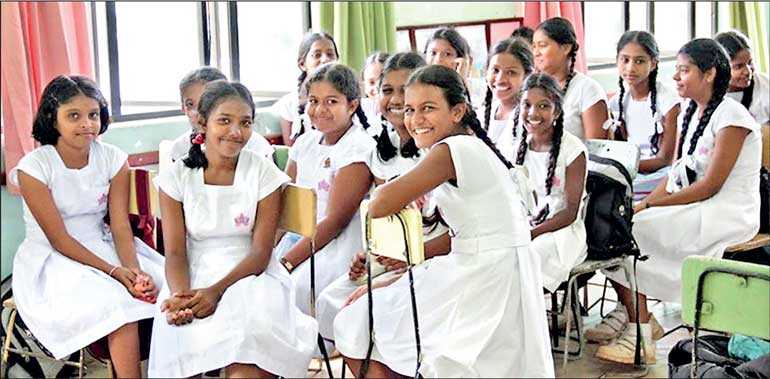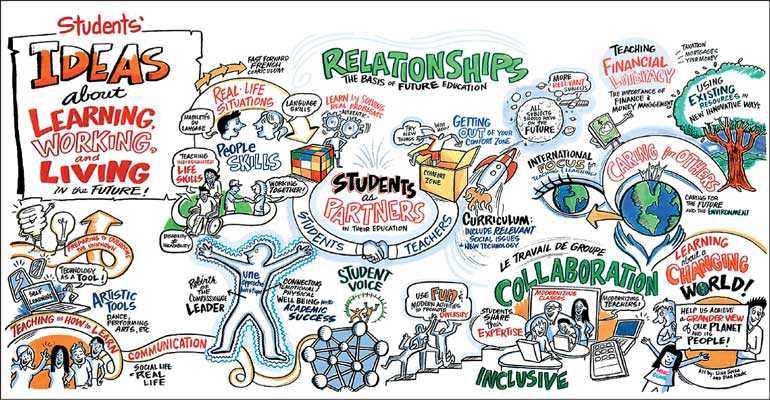Thursday Feb 19, 2026
Thursday Feb 19, 2026
Monday, 1 June 2020 00:20 - - {{hitsCtrl.values.hits}}


As lockdown restrictions ease, conversations on school education mainly consider two questions – how to reopen schools, and how to teach remotely (at least until schools can reopen) to students at home.
While even partially reopening schools is a challenge for every country, the situation in Sri Lanka is compounded by our system of elite schools; not only do their large populations increase transmission risk within the school, but their large catchment areas with many students travelling long distances in packed buses, trains and school vans extends the risk to the commute as well.
During curfew, the only option for teaching was via broadcast media (TV or radio) or the internet (Zoom, Teams, Classroom, etc.) to students at home (with the latter constrained by 34% internet penetration in households with school-age children and only 20% having access via a large screen device). However this need not necessarily be the case moving forward.
The middle path: Micro-classrooms
We don’t have to ‘Go big or stay home’ – the middle-path is to create micro-classrooms: Around eight children of a similar age within a locality (e.g. residing in the same street) congregate daily with their parents taking turns hosting them. Not only does this dramatically reduce transmission risk, instead of requiring 1 internet capable device + connection (or TV) per child, we now only need 1 per 8 (or maybe even 1 per 16 because 2 micro-classrooms could easily share the device during the course of the day) and can therefore reduce the divide between the haves and the have-nots. If the MoE and/or Telcos can provide free access (to the official sites and maybe also curated resources like Wikipedia, Khan Academy, etc.) it would further reduce the divide.
And when questions arise (as they inevitably will, either when viewing the content, or when attempting to solve, preferably working in groups of 2-4, practice questions/past papers) they can first discuss amongst themselves (this is another benefit of having some older children present – they can reinforce their own understanding by helping the younger children) and reach out to the teacher (via the video call if it is happening or even via a regular phone call) only if they need further assistance.
This arrangement also provides opportunities for children to enjoy some social activities – anything from singing songs to cultivating a home garden to cooking to physical games (for example, hop-scotch is quite easily playable with 1 m distancing). This is not only going to be crucial for their mental health, but these are also excellent vehicles for learning transversal skills like social responsibility, problem solving, communication, empathy, creativity, and team work that will be essential – probably even more than the official taught syllabus – for life and work in the 21st century.
Enriching the micro-classroom experience
There are many options to go beyond the basics:
Many parents and educators will feel some reservations as they read through that list, especially the last example – how can we allow children to play when they should be learning? That’s because over the years we’ve accumulated a full herd of pachyderms that we need to eradicate for the micro-classrooms to be vehicles for a much richer learning experience than described above:
Conventional schooling (both public and private) supposes that for students to learn, they must be taught by an adult expert (i.e. qualified teacher) and any conversation on learning styles is based on unsupported-by-research fallacies like Gardner’s Multiple Intelligences rather than considering, say, constructivist views of learning. That’s why the focus during lockdown has been on ‘how to teach remotely?’ rather than ‘how to help children learn remotely?’
Even with conventional classrooms, teaching subjects didn’t necessarily result in much learning (which is why there were many failures even by the hopelessly low benchmark of rote-memorisation exams) and children learn many things that are not explicitly taught in school (to quote both a positive and negative example, no school sets out to teach how to use a smartphone nor bullying, but clearly many children are learning both.)
This philosophy of education, especially with an emphasis on efficiency, cannot accommodate the natural curiosity of children to explore their environment and learn – because each child has unique interests that will vary over time. So not only is education trapped within a predefined syllabus (which will always be years out-of-date because of the time taken to revise them in a centralised way and then train teachers on it), some of the hidden curriculum of school has evolved explicitly to stamp out this curiosity as early as possible (‘preferably’ in pre-school). This is antithetical to the societal and economic requirement to have life-long learners. The efficiency mandate extends also to the way exams are conducted. Because it needs to be scalable (easy to administer and easy to grade) and objective, we are stuck with exams that largely measure regurgitation of knowledge. So even with those who do well in the exams, we don’t really have a good understanding of their capability (beyond, ‘can do well in exams’). To make matters worse, the university admission system selects for students who excel at memorising what they are told (and only what they are told), and then university academics wonder why the undergrads are not taking responsibility for their learning.
And therefore the problem isn’t that our children are failing exams – it is that the exam-centric education system is failing (to meet the needs of) our children. But as we are so invested in defining the success of ourselves, our children and of our educational institutions primarily by exam results (even if we  ourselves have failed those exams) it is going to be really hard to evict this particular jumbo. And especially for schools that have used exam results to build their brand, and attracted students with the promise of getting good examination results (and maybe even selected students deemed to have good potential at admission) it will be very difficult to make an about-face.
ourselves have failed those exams) it is going to be really hard to evict this particular jumbo. And especially for schools that have used exam results to build their brand, and attracted students with the promise of getting good examination results (and maybe even selected students deemed to have good potential at admission) it will be very difficult to make an about-face.
The scarcity of resources (‘good schools’ for the scholarship exams and ‘public university places’ for A/L exams) make those examinations high-stakes (and there’s no hope that this will be remedied anytime soon), and on top of that exam results have evolved into a badge of honour for the parents to get a one-up on the Jones’s, so we will continue to have teachers (and tutors) teaching to the test at the expense of any other forms of learning (even diminishing whatever limited ‘extra-curricular’ opportunities available in school for the development of transversal skills such as sports, societies and art) and the mental health of the children.
We must not allow rags-to-riches anecdotes (e.g. how a child of a fisherman qualified to study medicine) to promote the notion that our free education system is a meritocratic one where anyone who works hard can succeed. Working hard can change who succeeds (at the expense of someone else who will now fail) but not the total number of people who will succeed.
The way forward: Direction
We are obviously not the first to recognise these issues. For example, refer the work of Ken Robinson (and the most-watched TED talk ever), Peter Grey and John Holt. But the solutions don’t only exist in books: Democratic Schools (details in this article) have been functioning for decades, based on an alternative philosophy:
The way forward: Next steps
The beauty of this approach is that you don’t have to wait for permission from any authority – neither your school nor the Ministry of Education – to start.
With the current level of lockdown, these principles can be applied at home as an unschooling – just follow your child’s curiosity and interests, allow them to ask questions around your day-to-day tasks (e.g. cooking, gardening, balancing the household budget, etc.) and support them to find answers.
Talk to other parents in your neighbourhood to share your experiences and work out how you will start a micro-classroom when the restrictions ease further.
Hopefully we will soon have a community of micro-classrooms, who can help each other by sharing their successes as well as brain-storming solutions for their challenges – please do reach out to us via Instagram, Facebook, or Twitter.
As we document our successes and restrictions (hopefully) ease, we will find further opportunities to expand. For example, at best, only a small number of our under-resourced schools will receive the teachers they need to succeed under conventional teaching anytime soon (even if some miracle happens and we dramatically increase funding for education, there isn’t a ready-to-recruit pool of teachers). If the local communities around those schools have tasted success with this approach, they could experiment with progressing from micro-classrooms to micro-schools.
Independently of this, we are also working on setting up a Democratic School in Colombo that will incorporate all the above elements from Day 1.
(Despite holding a 1st Class degree in Engineering from the University of Moratuwa and having won several medals at the International Olympiad in Informatics, Sifaan Zavahir decided not to pursue a career in IT in favour of a calling he acquired from his years in AIESEC (the world’s largest youth leadership movement): helping people unleash their talents. Sixteen years of running interventions on Leadership, Team work and Creativity for corporates convinced him that the education system was not doing enough to prepare citizens for life and work in the 21st century. Coupled with his observations as a parent on the learning strategies that worked well with his son, he was working on starting Sri Lanka’s first Democratic School when the pandemic confined all children to house-arrest. The writer can be reached on [email protected]